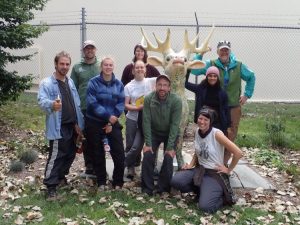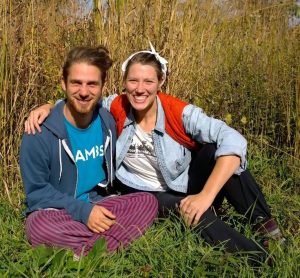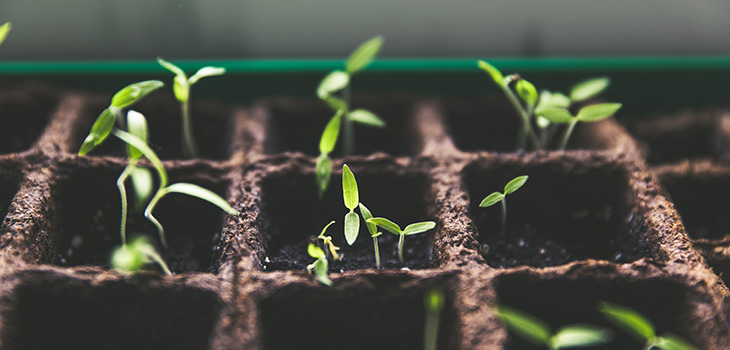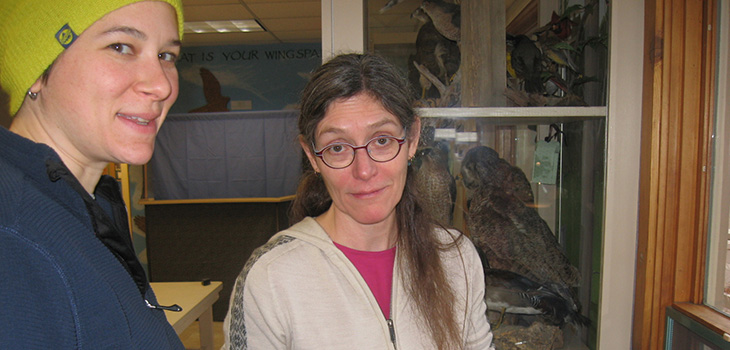 Benjamin and Rianna Isaak-Krauss bring a unique perspective to the 2018 cohort of Merry Lea’s Sustainability Leadership Semester (SLS): they are seminary students rather than undergraduates. The married couple will graduate from the Anabaptist Mennonite Biblical Seminary (AMBS) in 2019 with credits from the SLS on their transcripts.
Benjamin and Rianna Isaak-Krauss bring a unique perspective to the 2018 cohort of Merry Lea’s Sustainability Leadership Semester (SLS): they are seminary students rather than undergraduates. The married couple will graduate from the Anabaptist Mennonite Biblical Seminary (AMBS) in 2019 with credits from the SLS on their transcripts.
Benjamin is pursuing an M.Div. with an emphasis on theology and peacemaking, and Rianna is working on an M.A. in spiritual formation. They are the first AMBS students to incorporate the SLS into their academic programs.
Like the other four SLS students in their cohort, Benjamin and Rianna participated in an eight-day canoe trip and are exploring the local watershed through weekly field trips. They take the same courses on water resources, environmental policy, ethics, sustainability and problem-solving, and they live in Merry Lea’s student housing. The two add a theological bent and a little extra life experience from other parts of the world to group discussions. Benjamin grew up in Bammental, Germany, and Rianna is from Winnipeg, Canada.
Benjamin and Rianna say that the SLS does not feel like a step down to them even though they are older students. While they may have more to offer in the area of ethics, neither had taken science courses since high school. The opportunity to learn from scientists and other practitioners who work with environmental issues daily was important to them.
A framework for tackling complex problems
 The articulation agreement between Goshen College and AMBS that made their participation possible grew out of years of collaboration between Merry Lea and the seminary (see page 2). When Luke Gascho, Merry Lea’s executive director, taught a course on creation care at AMBS several years ago, he saw firsthand the interest that many seminary students had in sustainability. Rebecca Slough, then dean of the seminary, also recognized the ways that both institutions could benefit by making place-based experiential learning on sustainability available to seminary students.
The articulation agreement between Goshen College and AMBS that made their participation possible grew out of years of collaboration between Merry Lea and the seminary (see page 2). When Luke Gascho, Merry Lea’s executive director, taught a course on creation care at AMBS several years ago, he saw firsthand the interest that many seminary students had in sustainability. Rebecca Slough, then dean of the seminary, also recognized the ways that both institutions could benefit by making place-based experiential learning on sustainability available to seminary students.
“I think the SLS can be a great experience for pastors. It would especially benefit seminarians who are interested in leadership roles in other contexts because it provides a framework for working on complex problems in the public square,” Luke remarked. The experience can help seminarians apply their theology to particular places and contexts. The most likely candidates for the program might be students who are pursuing a master’s in peace studies.
Commitment to faith and the earth
In many ways, Benjamin and Rianna typify the kind of seminary students who can benefit most from the SLS. While their future plans are still hazy, both have a longstanding commitment to the earth that intertwines with their faith.
Rianna sees many links between what she describes as “spiritual sustainability” in a post-Christian era and the need for sustainable approaches to natural resources. She has a vision for a series of retreats that could integrate the two. One example is a workshop in which an herb garden also functions as a prayer labyrinth, and the physical tasks of weeding and harvesting become metaphors that embody the tending needed for a healthy spirituality.
Benjamin came to the SLS by way of a formative year on a Christian Palestinian farm in the West Bank. During this gap year following high school, he saw the farmers’ dedication to their land.
“I learned a lot about water conflicts and land conflicts. I learned that the environment can be something that divides us or something that brings us together,” he said.
While he considered studying ecology, Benjamin chose theology as his field because he realized that his faith was what really fueled him. The option of incorporating sustainability into his theological degree was part of what drew him to AMBS.
What new insights have the AMBS students gained from the SLS so far? For Rianna, prior experience as a canoe trip leader for adventure-based youth ministry deepened her encounter with the Elkhart River Watershed during the SLS canoe trip.
“We’ve always used the land as a backdrop for relationship building or Christian formation or another purpose. Here on this trip, the focus was on actually paying attention to the land and river. It made me realize how I had previously objectified the landscape for my own purposes,” she recalled. Taking an intimate look at one watershed has also given her a desire to put down roots in a particular place.
Benjamin mentioned exercises in the semester’s Faith, Ethics and Ecojustice class that pushed him to wrestle with values. “We don’t often think about why we care about something. Nor do we spend time thinking about what our place is in making change. Luke challenged us to think about what sustains me, what is driving me to do the work I do, and how I relate to others in that,” he said.
A curriculum for youth
A point of integration for Benjamin and Rianna is the problem-solving project they are completing as part of an SLS course. The couple is working together on a curriculum for a weeklong summer experience for church youth groups that will focus on the local community and sustainability. They are fleshing out an idea that originated with a group of local pastors who are committed to bringing the idea to fruition.
Imagine churches all over the country with pastors who see creation care as an integral part of the Christian faith. Imagine leaders of Christian organizations who have a repertoire of ways to connect with their local communities. The AMBS—Merry Lea partnership will continue to work toward this vision.



